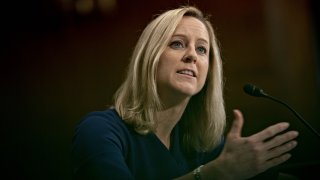
- The Consumer Financial Protection Bureau issued a statement Tuesday saying it may reconsider mortgage standards (the General QM and Seasoned QM rules).
- The CFPB issued the rules in December, when Kathy Kraninger, an appointee of President Donald Trump, was head of the agency.
- Consumer advocates believe the rules may promote the sort of risky borrowing that led to the financial crisis in 2008.
The Biden administration hinted it may dismantle mortgage rules inked during the waning days of Donald Trump's presidency.
Those Trump-era rules erase protections for borrowers and may open the door to risky loans that led the housing bubble to burst in the 2008 financial crisis, according to some consumer advocates.
The Consumer Financial Protection Bureau said Tuesday it is considering whether to "revisit" the rules, issued in December when Trump appointee Kathy Kraninger led the agency. (She stepped down last month at the request of President Joe Biden.)
Feeling out of the loop? We'll catch you up on the Chicago news you need to know. Sign up for the weekly Chicago Catch-Up newsletter here.
More from Personal Finance:
$400 unemployment boost: Republicans revive anxiety over effect on jobs
Failure to report cryptocurrency on your tax return can lead to trouble
Self-employed and gig workers could get bigger PPP loans
The bureau is charged with protecting consumers from abuse and predatory practices in credit cards, loans and other common financial services. It was created in 2011.
The new Trump-era measures — the Seasoned QM and General QM rules — relate to certain residential loans for homeowners. They rewrite protections codified in the Dodd-Frank financial reform law after the Great Recession.
Money Report
"Big deal"
Both are a type of qualified mortgage, a category that carries legal protections for lenders from consumer lawsuits. That may happen, for example, if borrowers can't make monthly payments and lose their homes to foreclosure.
The new rules are scheduled to phase in starting March 1.
"It's a big deal," Patricia McCoy, a professor at Boston College Law School, said of the CFPB's notice to possibly tweak the Trump-era measures. "The Seasoned QM rule is a really, really dangerous rule for consumers."
If undertaken, the rulemaking process may ultimately change or rescind the rules, the CFPB said.
Given its public statement on Tuesday, it's likely the agency will act, said McCoy, who oversaw mortgage policy at the CFPB during the Obama administration.
"If they're signaling it, they don't say that lightly," she said.
But some groups believe the Trump-era rules should remain in place.
They will help banks and other lenders innovate and extend more mortgages to underserved groups, like Black and Hispanic homebuyers, according to Robert Broeksmit, president and CEO of the Mortgage Bankers Association.
"We encourage the bureau to permit them to take effect as scheduled," Broeksmit said.
Mortgage rules
Consumer advocates are especially concerned by the Seasoned QM rule. It creates a new standard for a mortgage to be deemed "qualified."
Qualified status is important for both homebuyers and lenders. It's essentially a government stamp of approval that a lender reasonably determined a borrower could afford their loan — the so-called "ability to repay." Lenders get legal protection in court and consumers have peace of mind they have a sustainable loan.
Around 95% of mortgages are qualified, according to the Center for Responsible Lending.
Prior to the Trump-era rewrite, a loan was generally deemed "qualified" if a borrower's debt load wasn't too high (more than 43% of their monthly income). Government-sponsored entities Fannie Mae and Freddie Mac make exceptions in some cases based on other financial factors.
A borrower's ability to repay helps set the demarcation line between prime (high-quality) and sub-prime loans.
"This is one of the foundational rules of reform coming out of the Great Recession," said Mike Calhoun, president of the Center for Responsible Lending. "It goes right to the heart of what caused the financial crash."
The Seasoned QM rule also grants qualified status to a loan if borrowers make timely monthly payments on their mortgage over a three-year period.
Loans that weren't deemed "qualified" at the time of origination could eventually get that label.
Consumer groups fear this may grant legal protection to risky mortgages and makes it more economical for lenders to make loans wither higher default rates. These risky loans could then be sold into the secondary market, where they're bundled together with other mortgages and bought by investors.
"We think it's too loose and creates some bad incentives to do some of the unsustainable ending we saw in the crisis," Calhoun said. "We don't want to encourage high-failure lending."
But many protections remain in place to prevent banks from making ultra-risky mortgages, Broeksmit said. For example, adjustable-rate mortgages and those with terms longer than 30 years can't get qualified status. At the same time, banks may take a bit more risk and lend more to underserved communities, he said.
The Trump-era rules would also get rid of the 43% debt-to-income ratio and replace it with a different General QM standard. Loans would instead be qualified if their interest rate is below a threshold pegged to the average prime offer rate, or APOR.
This change doesn't seem onerous, Calhoun said. Community banks have used the same standard for years and have been making loans responsibly with that test, he said.






